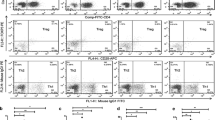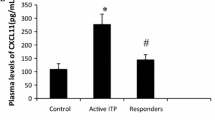Abstract
To investigate the possible correcting of T helper (Th) cytokine profiles by high-dose dexamethasone (HD-DXM) therapy in chronic idiopathic thrombocytopenic purpura (ITP) with active disease, we determined the plasma levels of IFN-γ, IL-2, IL-4, IL-10, and TGF-β1 in 52 patients before and after oral administration of 40 mg/day DXM for four consecutive days. The cytokine levels were measured by enzyme-linked immunosorbent assay. The results showed that initial responses were reached in all patients and sustained response (SR) rate is 46.15%. The pretreatment plasma levels of both IFN-γ and IL-2 were significantly increased and those of IL-4, IL-10, and TGF-β1 significantly decreased, compared with those of the normal controls (P < 0.01), indicating a Th1-dominant cytokine profile typically found in ITP. After HD-DXM treatment, IFN-γ and IL-2 were decreased (P < 0.01), whereas IL-4 and IL-10 were increased (P < 0.05). There was no significant difference between the HD-DXM-treated patients and the normal controls (P > 0.05). TGF-β1 was also increased (P < 0.01) after HD-DXM treatment, but still lower than that of the normal controls (P < 0.05). During following-up, the cytokine profiles in the SRs remained stable compared to the posttreatment level (P > 0.05), but IFN-γ and IL-2 levels raised up, and IL-4, IL-10, and TGF-β1 levels reduced again in the relapsed patients (P < 0.01). Our data demonstrate that HD-DXM is an effective initial therapy for ITP, and the Th1 cytokine dominance could be corrected by HD-DXM.
Similar content being viewed by others
References
Kuwana M, Kaburaki J Ikeda Y. Autoreactive T cells to platelet GPIIb-IIIa in immune thrombocytopenic purpura: role in production of anti-platelet autoantibody. J Clin Invest 1998;102:1393–402.
Hedlund-Treutiger I, Wahlstrom J, Elinder G. Role of the T cell receptor in idiopathic thrombocytopenic purpura (ITP). Acta Paediatr Suppl 1998;424:46–50.
Semple JW, Lazarus AH, Freedman J. The cellular immunology associated with autoimmune thrombocytopenic purpura: an update. Transfus Sci 1998;19:245–51.
Cines DB, McMillan R. Management of adult idiopathic thrombocytopenic purpura. Annu Rev Med 2005;56:425–42.
Semple JW, Freedman J. Increased antiplatelet T helper lymphocyte reactivity in patients with autoimmune thrombocytopenia. Blood 1991;78:2619–25.
Garcia-Suarez J, Prieto A, Reye E, Manzano L, Merino JL, Alvarez-Mon M. The clinical outcome of autoimmune thrombocytopenic purpura is related to their T-cell immunodeficiency. Br J Haematol 1993;84:464–70.
Ware RE, Howard TA. Elevated numbers of gamma delta(γδ+)T lymphocytes in children with immune thrombocytopenic purpura. J Clin Immunol 1994;14:237–47.
Crossley AR, Dickinson AM, Proctor SJ, Calvert JE. Effects of interferon-á therapy on immune parameters in immune thrombocytopenic purpura. Autoimmunity 1996;24:81–100.
Erduran E, Aslan Y, Aliyazicioglu Y, Mocan H, Gedik Y. Plasma soluble interleukin-2 receptor levels in patients with idiopathic thrombocytopenic purpura. Am J Hematol 1998;57:119–23.
Ogawara H, Handa H, Morita K, Hayakawa M, Kojima J, Amagai H, et al. High Th1/Th2 ratio in patients with chronic autoimmune thrombocytopenic purpura. Eur J Haematol 2003;71:283–8.
Panitsas FP, Theodoropoulou M, Kouraklis A, Karakantza M, Theodorou GL, Zoumbos NC, et al. Adult chronic idiopathic thrombocytopenic purpura (ITP) is the manifestation of a type-1 polarized immune response. Blood 2004;103:2645–7.
Wali YA, Al Lamki Z, Shah W, Zacharia M, Hassan A. Pulsed high-dose dexamethasone therapy in children with chronic idiopathic thrombocytopenic purpura. Pediatr Hematol Oncol 2002;19:329–35.
Cheng Y, Wong RS, Soo YO, Chui CH, Lau FY, Chan NP, et al. Initial treatment of immune thrombocytopenic purpura with high-dose dexamethasone. N Engl J Med 2003;349:831–6.
Borst F, Keuning JJ, van Hulsteijn H, Sinnige H, Vreugdenhil G. High-dose dexamethasone as a first- and second-line treatment of idiopathic thrombocytopenic purpura in adults. Ann Hematol 2004;83:764–8.
George JN, Woolf SH, Raskob GE. Idiopathic thrombocytopenic purpura: a guideline for diagnosis and management of children and adults. American Society of Hematology. Ann Med 1998;30:38–44.
British Committee for Standards in Haematology. General Haematology Task Force: Guidelines for the investigation and management of idiopathic thrombocytopenic purpura in adults, children and in pregnancy. Br J Haematol 2003;120:574–96.
Gutierrez-Espindola GR, Morales-Polanco MR, Guerrero-Rivera S, Talavera JO, Sanchez-Valle E, Gomez-Morales E, et al. High doses of dexamethasone in adult patients with idiopathic thrombocytopenic purpura. Arch Med Res 2003;34:31–4.
Mazzucconi MG, Fazi P, Bernasconi S, De Rossi G, Leone G, Gugliotta L, et al. Therapy with high-dose dexamethasone (HD-DXM) in previously untreated patients affected by idiopathic thrombocytopenic purpura. A GIMEMA experience. Blood 2007;109(4):1401–7.
Andersson J. Cytokines in idiopathic thrombocytopenic purpura (ITP). Acta Paediatr Suppl 1998;424:61–4.
Yoshimura C, Nomura S, Nagahama M, Ozaki Y, Kagawa H, Fukuhara S. Plasma-soluble Fas (APO-1, CD95) and soluble Fas ligand in immune thrombocytopenic purpura. Eur J Haematol 2000;64:219–24.
Andersson PO, Stockelberg D, Jacobsson S, Wadenvik H. A transforming growth factor-beta1-mediated bystander immune suppression could be associated with remission of chronic idiopathic thrombocytopenic purpura. Ann Hematol 2000;79:507–13.
Andersson PO, Olsson A, Wadenvik H. Reduced transforming growth factor-beta1 production by mononuclear cells from patients with active chronic idiopathic thrombocytopenic purpura. Br J Haematol 2002;116:862–7.
Jackson M, Ahmad Y, Bruce IN, Coupes B, Brenchley PE. Activation of transforming growth factor-beta1 and early atherosclerosis in systemic lupus erythematosus. Arthritis Res 2006;8:R81.
Agarwal SK, Marshall GD Jr. Dexamethasone promotes type 2 cytokine production primarily through inhibition of type 1 cytokines. J Interferon Cytokine Res 2001;21:147–55.
Wang T, Zhao H, Ren H, Guo J, Xu M, Yang R, et al. Type 1 and type 2 T-cell profiles in idiopathic thrombocytopenic purpura. Haematologica 2005;90:914–23.
Adcock IM, Brown CR, Gelder CM, Shirasaki H, Peters MJ, Barnes PJ. The effects of glucocorticoids on transcription factor activation in human peripheral blood mononuclear cells. Am J Physiol 1995;37:C331.
Peng J, Liu CF, Liu D, Ren C, Li W, Wang Z, et al. Effects of B7-blocking agent and/or CsA on induction of platelet-specific T-cell anergy in chronic autoimmune thrombocytopenic purpura. Blood 2003;101:2721–6.
DeKruyff RH, Fang Y, Umetsu DT. Corticosteroids enhance the capacity of macrophages to induce Th2 cytokine synthesis in CD4+ lymphocytes by inhibiting IL-12 production. J Immunol 1998;160:2231–7.
Acknowledgments
We are grateful to the following scholars for their clinical and laboratory help: Prof. Zhenhua Tu, Prof. Chunyan Ji, Yuanyuan Zhu, Prof. Luqun Wang, Dr. Chuanli Zhao, and Dr. Qiang Song (Centre of Haematol/Oncology, Qilu Hospital, Shandong University, Jinan, China), and we are also grateful to Dr. Qianli Zhuang for critical review of this article. This work is supported by grants from National Natural Science Foundation of China (nos. 30300312, 30470742, 30579779, and 30600259), 973 Program 2006 CB 503803 and Key Clinical Research Project of Public Health Ministry of China 2004–2006.
Author information
Authors and Affiliations
Corresponding author
Rights and permissions
About this article
Cite this article
Guo, C., Chu, X., Shi, Y. et al. Correction of Th1-dominant Cytokine Profiles by High-dose Dexamethasone in Patients with Chronic Idiopathic Thrombocytopenic Purpura. J Clin Immunol 27, 557–562 (2007). https://doi.org/10.1007/s10875-007-9111-1
Received:
Accepted:
Published:
Issue Date:
DOI: https://doi.org/10.1007/s10875-007-9111-1




